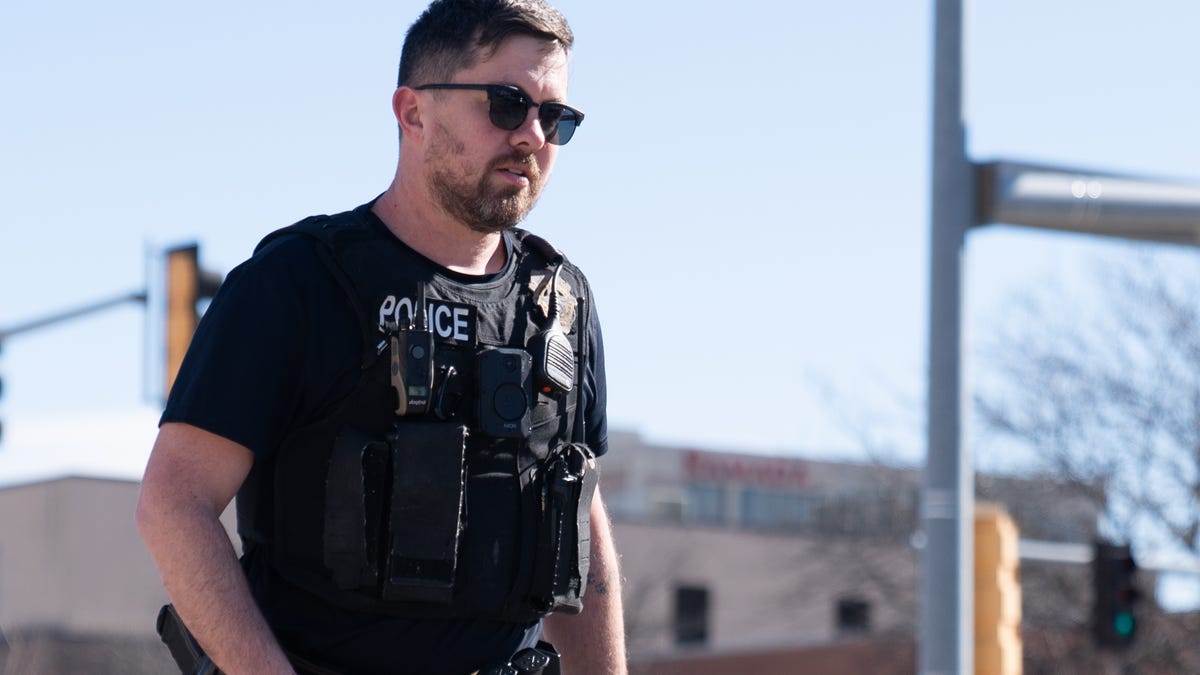Kansas
Inspired by death of beloved dog, Kansas police animal protection bill set to become law • Kansas Reflector

TOPEKA — Posting a “Wizard of Oz” meme and accusing Gov. Laura Kelly of “political spite,” House Speaker Dan Hawkins led the charge to make those who severely injure or kill police dogs pay for their medical care or funerals.
House Bill 2583, known as “Bane’s Law,” was inspired by a Sedgwick County service dog named Bane that was killed last year by a fleeing suspect the dog had chased into a sewer drain.
Kelly vetoed the bill but on Monday was overridden 105-20 in the House and 29-10 in the Senate The law increases penalties for inflicting harm on law enforcement animals, including horses. The felony crime is now punishable by a minimum of 90 days in jail and a minimum fine of $10,000.
During the incarceration period, the perpetrator also will have to go through a psychological evaluation and completion of an anger management program as a condition of probation, although this provision is already included in Kansas statute.
The bill was introduced by Hawkins, R-Wichita, and Rep. Stephen Owens, R-Hesston, earlier in the session. Kansas statute previously required a minimum of 30 days in jail and a fine of more than $500 and less than $5,000 for the crime of severely harming or killing police dogs.
In her veto explanation, Kelly said the death of law enforcement animals is always a tragedy, but the heightened sentencing, psychological evaluation and anger management requirements were not mandated for other, more severe offenses.
“House Bill 2583 imposes mandatory minimum sentences that disregard important factors that should be left to the discretion of a judge through the regular sentencing process,” Kelly said. “Second, the mandatory sentences are out of line with other, more severe crimes without justification for why that is required. Third, while the requirement for a psychological evaluation and anger management program are important, we do not apply this same standard to many other heinous crimes.”
In response, Hawkins posted on X a meme of Kelly photoshopped into a picture of the Wicked Witch of the West from “The Wizard of Oz,” with the caption, “I’ll get you law enforcement, and your little dogs too!” Underneath, he wrote: “Don’t forget Gov. Kelly vetoed a bill increasing penalties for killing or injuring police dogs out of pure political spite.”
Others shared Kelly’s concerns about the implications of the bill’s heightened punishments.
Because people who harm or kill these animals under the law are now responsible for restitution to the law enforcement agency — paying for the injured animal’s medical treatment, as well as funeral expenses if the animal dies, and the cost of replacing and training a new animal — expenses can be thousands of dollars, adding an additional burden to the jail time and fine.
Rep. Ford Carr, D-Wichita, mentioned the historical use of police dogs to harm people fighting for equality during the Civil Rights movement in previous bill debate.
“We should trust the police, but oftentimes we can’t, and that’s an issue,” Carr said during Monday’s House veto override debate.
Rep. Timothy Johnson, R-Basehor, who worked for decades in law enforcement and had experience with police dog training, pushed back on Carr’s claims. Johnson said the dogs were highly trained for all circumstances.
“They are not used as bite dogs. That is not their focus,” Johnson said. “… They become your family. I had one of the most wonderful German Shepherds in my entire life experience. We literally had a family funeral when he passed away. That animal would obey every and any command. I could walk in a schoolhouse among children and you would never know. Please, do not equate things that happened in the 1960s, in the ‘50s, with the way training is done now. It’s not allowed.”
Owens brought up the circumstance of Bane’s death in his defense of the bill, emphasizing K-9 officers’ role in protecting officers.
“That defendant brutally kicked that dog and caused significant internal damage to the point it was so weak that that individual was able to strangle that dog to death,” Owens said. “I want you to think if we had sent a law enforcement officer down there, how that might have played out.”

Kansas
MMIP Series | KSHB 41 I-Team discovers scant interest among Kansas police in MMIP training

KANSAS CITY, Mo. — Over the last two years, the KSHB 41 I-Team has investigated the MMIP (Missing and Murdered Indigenous People) crisis in our community.
It’s a national movement that highlights how Indigenous people, particularly women, face much higher rates of violence, including assault, rape, murder, and trafficking.
The I-Team covered the disappearance of Quana Big Spring, a Belton teenager, and the Independence cold case murder of Lakota Renville.
Those are two examples of how the crisis is playing out in the Kansas City area.
This is a place the public may not think is part of this nationwide epidemic.
During our investigation, we also learned Kansas lawmakers passed a bill in 2021 that offers free training to law enforcement officers on how to investigate MMIP cases, as they have certain cultural and jurisdictional aspects that set them apart.
“It was Kansas’ first step for MMIP,” Kansas Representative Christina Haswood said, a Democrat from Lawrence who co-sponsored the bill and helped it pass.
The I-Team wanted to find out just how many law enforcement agencies actually took that step.
We reached out to every one of them, more than 300 police departments and sheriff’s offices across the state. We asked how many were aware of the MMIP training and had taken the class.
The class is voluntary, not mandatory.
37 agencies responded. 27 of those were aware of the training and nine agencies had already taken it, which is 3%.
Our findings shocked and disappointed Haswood, who is one of the only Native American lawmakers in the state.
“And you said you reached out to everyone?” Haswood said when we handed her our findings. The data was compiled onto a spreadsheet.
“That really gets me fired up because we can see with your findings that there’s such a big gap of communication and education, that there’s definitely work that needs to be done,” she said.
Fighting for this training is personal to her. Many of her constituents in Lawrence are Native and represent tribal nations across the country.
“It really angers me that we come together, and we say, ‘Here are the resources that you ask [for] and can hopefully get you elevated on your knowledge,’” Haswood said. “But when it’s given voluntarily, the resources are not being used.”
Haswood says there’s a perception at the statehouse that Native Americans don’t exist. She says she has spent a lot of time explaining to other lawmakers that Native Americans don’t just live on reservations and that Native issues are still relevant today.
Another perception the I-Team noticed was multiple law enforcement agencies saying the MMIP training isn’t a high priority because they’re not close to a reservation or they don’t know of any MMIP cases.
“This is an issue that even though you might not see every day with your own eyes, it is happening, and if we continue to operate like this, when it does happen, that we don’t have a system that’s robust enough to help Indigenous peoples,” Haswood said.
Kansas is home to four tribal nations: Prairie Band Potawatomi Nation, Kickapoo Tribe in Kansas, Iowa Tribe of Kansas and Nebraska, and Sac and Fox Nation of Missouri in Kansas and Nebraska.
Although MMIP cases don’t happen as frequently in Kansas as in other part of the U.S., the issue still hits close to home for many families.
We met some of those families last spring when we visited the Prairie Band Potawatomi Nation for a MMIW walk and ceremony.
“The MMIW movement is new, but the issues are not,” one speaker said.
Much of the movement focuses on Indigenous women, which is what the “W” stands for, though it was expanded to include all Indigenous people.
We talked to sisters Jessi and Rachelle Blacksmith, who run the MMIP chapter of northeast Kansas. They’re advocating for their brother, Willie Blacksmith, who was murdered in July 2022.
“We’re trying to make something good out of what happened to our brother to help others,” Rachelle said.
They learned about the state’s MMIP training and took it themselves. They say it would be beneficial to all police agencies.
“What are you supposed to do if a murder happens? This tells you what to do, this goes through the steps [of] what to do,” Jessi said.
Haswood says its about livelihoods and knowing that government systems have their back.
She hopes she can add more teeth to the training by making sure all agencies are aware of the training and set aside an hour to take it, and make it mandatory, instead of voluntary.
“I’ll continue to fight for this issue,” Haswood said.
Only one law enforcement agency, the Galena police department, out of the 325 in the state, said they’d make the training mandatory.
Several agencies said they’d take it or would consider taking it after we reached out.
The Gardner police department took the training the day we called.
During our investigation, we contacted Salina police about the training and a 2019 MMIP case in their jurisdiction. We later received a call from one of the department’s detectives, who told us he spent four hours investigating that 2019 case after we reached out. He discovered the missing man was an unclaimed body in Columbia, Missouri.
Although it’s a sad ending, the man’s daughter, who had spent years contacting morgues across the country, told us she was grateful to have closure and finally know what happened to her dad.
We shared that story with Haswood, who said the training is “literally helping people.”
Anyone can take the online training by going to the Kansas Law Enforcement Training Center page.
Kansas
Kamal Hadden Signs Rookie Contract With Kansas City Chiefs

Former Tennessee Volunteers corner Kamal Hadden signed his rookie contract with the Kansas City Chiefs.
Former Tennessee corner Kamal Hadden underwent a rookie minicamp with the Kansas City Chiefs after being selected by them last month. He officially signed his rookie contract with the organization; the four-year deal is valued at $4,158,396, with $138,396 in signing bonuses.
The Kansas City Chiefs recognized his growth during his tenure at the University of Tennessee and selected him with the No. 211 pick in the 2024 NFL Draft. Hadden became Tennessee’s third draft pick of the day and their third overall during this year’s draft process. He also became the third defensive back selected from Tennessee under head coach Josh Heupel.
“Tennessee prepared me greatly for the league, sticking with me and helping me grow as a man and helping me grow as a player. They helped me tremendously… just giving me the opportunity to showcase who I am as a player but also as a man.” – Kamal Hadden to reporters at the 2024 NFL Combine
You Might Also Like:
Join the Community:
You can follow us for future coverage by clicking “Follow” on the top right-hand corner of the page. Also, be sure to like us on Facebook @VolunteerCountry & follow us on Twitter at @VCountryFN.
Kansas
Kansas City, Kansas hospital to halt labor, delivery services

KANSAS CITY, Kan. (KCTV) – Major changes for Kansas City, Kansas residents amid Providence Medical Center announcement.
The KCK hospital announced it will no longer offer a vital service.
Labor and delivery will be no more starting June 30, 2024.
Providence said it is exploring partnerships with other hospitals in the area in hopes patients can continue services as needed.
The hospital released the following statement:
Providence Medical Center Board of Directors, we are deeply saddened to announce that due to the steady decline in Labor and Delivery patients over the last ten years, Providence Medical Center will no longer be able to offer Labor and Delivery services on our healthcare campus, effective June 30, 2024.
We are exploring partnerships with hospitals and clinics in the Kansas City metropolitan area to assist our community with the transition. We will continue to provide, and expand, gynecological services at 8101 Parallel Parkway, Kansas City, KS to meet patient demand.
We want to thank all our past, and present, hard-working staff and community partners that worked tirelessly to provide Labor and Delivery healthcare services in Wyandotte County and surrounding counties for over 100 years.
ALSO READ: St. Luke’s reunites trauma survivors with medical staff
Copyright 2024 KCTV. All rights reserved.
-

 Politics1 week ago
Politics1 week ago'You need to stop': Gov. Noem lashes out during heated interview over book anecdote about killing dog
-

 News1 week ago
News1 week agoMan, 75, confesses to killing wife in hospital because he couldn’t afford her care, court documents say
-

 Politics1 week ago
Politics1 week agoRFK Jr said a worm ate part of his brain and died in his head
-

 World1 week ago
World1 week agoPentagon chief confirms US pause on weapons shipment to Israel
-

 Politics1 week ago
Politics1 week agoHere's what GOP rebels want from Johnson amid threats to oust him from speakership
-

 World1 week ago
World1 week agoPro-Palestine protests: How some universities reached deals with students
-

 World1 week ago
World1 week agoConvicted MEP's expense claims must be published: EU court
-

 Politics1 week ago
Politics1 week agoCalifornia Gov Gavin Newsom roasted over video promoting state's ‘record’ tourism: ‘Smoke and mirrors’




















